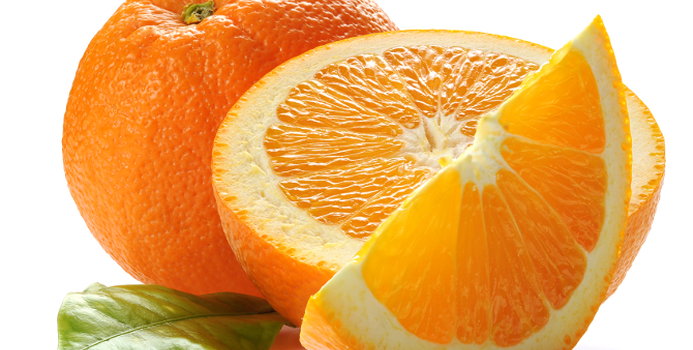There are many varieties of oranges grown around the world but some of the most commonly grown types are Navel, Blood or Valencia oranges. Oranges are popular for their sweetness, texture, flavor, ease of peel and the ability to withstand transport. Well-known for their vitamin C, oranges also pack a lot more good nutrition. Furthermore, vitamin C is a water-soluble vitamin so you need to consume vitamin-C rich foods (like oranges!) every day.
The Nutritional Value of Oranges
1 cup of orange segments
Calories: 85
Fat: 0g
Protein: 2g
Carbohydrates: 21g / 7% DV
Fiber: 4g / 17% DV
Vitamin C: 95.8mg / 160% DV
Folate: 54.0mcg / 14% DV
Thiamin: 0.2mg / 10% DV
Potassium: 326mg / 9% DV
The Health Benefits of Oranges
- They are a good source of folate! Folate is a vitamin that is a part of making new body cells by helping to produce DNA and RNA. It also works in part with vitamin B12 to form hemoglobin for red blood cells. This nutrient is especially important for pregnant mothers -- without enough folate, babies can be born with neural tube defects. For those at risk of cardiovascular disease, consuming enough folate will help control plasma homocysteine levels.
- Oranges are also a good source of Thiamin, which is used by the body to produce energy from carbohydrates in all cells in the body. It is a water-soluble vitamin so you just excrete whatever your body doesn't use in urine.
- Potassium is an electrolyte that helps regulate mineral and fluid balance inside and out of cells. It is also important for maintaining normal blood pressure by blunting the effects sodium/salt has on blood pressure. Furthermore, this is a very important mineral because it helps transmit nerve impulses, which signal muscle contractions. Athletes especially should aim to consume enough potassium.
Oranges and Vitamin C
Vitamin C is a very important nutrient and is found in high concentrations in oranges. Here are just a few of the ways vitamin C works in the body:
- Works as an antioxidant to slow damage caused by free radicals in body fluids
- Helps protect you from infection and boosts immunity by signaling for antibodies
- If you are worried about anemia or iron deficiency, consume your iron-rich foods with high vitamin C foods to increase absorption from plant sources of food (folate is also better absorbed with vitamin C)
- Helps keep gums health and improves the rate of healing for cuts and wounds
- Protects you from bruising by helping blood vessels and capillary walls stay strong
- Plays a part in producing collagen, which is a connective tissue that holds muscles, tissues and bones together
- Although vitamin C will not 'cure' a cold, it does play an important role in fighting infections
- Extra vitamin C may have a small antihistamine effect, which may in turn shorten the length of sick time and make the symptoms milder
- Research is exploring if there is a link to reduced risk of cancer and cataracts with consuming vitamin C

Emily DeLacey MS, RD is a Registered Dietitian and currently working in Jamaica as a HIV/ AIDS Prevention Specialist. She attended Central Washington University for her Bachelor's Degree in Science and Dietetics and continued on after her internship to Kent State University for her Master's Degree in Science and Nutrition, with a focus on public health and advocacy. She served as a U.S. Peace Corps Volunteer in Malawi 2012-2014 working as a Community Health Advisor in a rural village, immersing in the joys of life without electricity or running water. She has been to 20+ countries and 47 of the 50 states in the US. Traveling, adventuring and experiencing new cultures has made her a passionate advocate for the equality of nutrition and wellness for all people.



